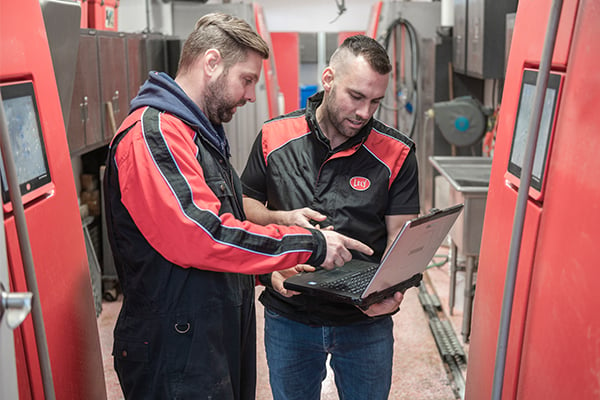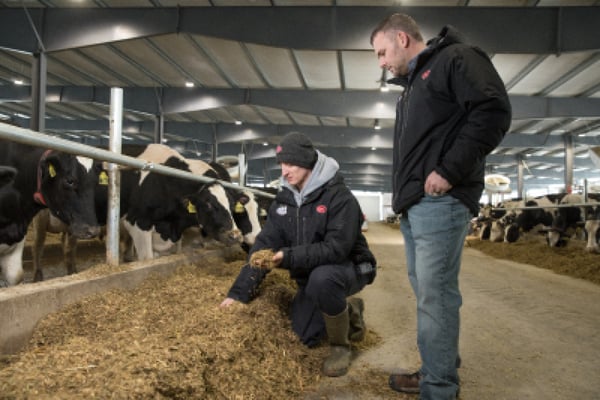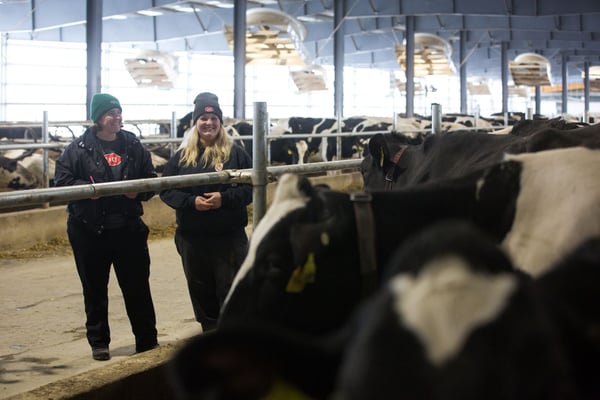Lely's Farm Management Support (FMS) team is here to offer long-term support for innovative dairy producers who have chosen dairy robotics for the continuity of their businesses. Each local Lely Center has a trained and certified FMS advisor on staff who is backed by the worldwide knowledge of Lely's network of experts. For farmers who are new to dairy automation, the FMS team provides a three-phase process for the transition to robotic milking.
Phase One: Before Startup
Before startup begins, a Lely FMS advisor will provide knowledge, experience and expertise on the transition to milking with the Lely Astronaut A5 robotic milking system. With more than 25 years of experience in robotic milking, Lely has amassed a wealth of knowledge, and implemented a digital protocol called the Lely RoadBook that describes the entire preparatory phase leading to startup. This document includes important information collected from Lely's real-world experiences with and feedback from dairy producers who have made this transition.
Lely FMS advisors are committed to partnering with dairy producers to make their transition to automation a success. The biggest priority of Lely FMS is to ensure each dairy producer understands the process and goals of robotic milking, from the first seven days of startup to the long-term outlook. The FMS advisor will sit down with the dairy producer to establish goals and decide how to most efficiently utilize the operation's space and equipment. The FMS advisor will also work closely with industry experts to ensure optimal results during the transition. They will coordinate with the dairy producer and their nutritionist to tailor the operation's feeding strategy for robotic milking and align with the farmer's goals.

Before startup with Lely robots, there are a few key areas dairy producers must focus on to effectively prepare for the transition. Each cow's udder condition must be addressed, ensuring healthy teat ends and proper teat sizing for optimal liner fit. Their tail switches will also need to be trimmed prior to startup and maintained on a regular basis to allow for unhindered milking. The FMS advisor will help the dairy producer enter each cow's data into the Time for Cows (T4C) management system at least three weeks before startup and help familiarize them with the system. Lely tag collars will also be fitted onto each cow and tested.
While not always possible for new-build facilities, pre-training the cows has proven to be an effective method to ease the transition process. This involves enticing the cows into the robot with a tasty feed mix and guiding them through the box with the robot arm moving around underneath the cow. Doing this for a few days prior to official startup will lower the stress level of the herd during the first few milkings.
Phase Two: During Startup
The Lely Technical Service Support (TSS) team will install the robots, ensuring that each one fits properly into the operation's specific barn design. During the first few days, temporary gates and many hands will be required to guide the cows through the robots. The local Lely Center's FMS team will be present 24/7 throughout the first few days of startup to help guide the cows through the robots.
For robotic milking, it is important to stimulate the behavior of the cow advancing to the robot and repetition is key. This being said, three milkings per day for each cow is generally an ideal goal. Cows are creatures of habit, and ensuring they have a consistently pleasant experience with the robot is vital. Based on previous startups, the majority of cows will begin to voluntarily go to the robot within the first three days. After a few more days, only cows who have a milking interval of 10 or more hours will need to be fetched four times a day. This number will gradually go down to two fetchings per day for cows who have a milking interval of more than 12 hours.

Transitioning to robotic milking also requires a change in feed strategy. Part of what draws a cow to the robot involves giving her a treat within the box. Because of this, it is necessary to remove some of the energy from the feed bunk, and go from a total mixed ration (TMR) system to a partial mixed ration (PMR). A balanced diet is still provided, but will now be divided between the robot and bunk. Each feed ration the cow receives in the robot is customized to suit her specific needs and will give her about 20% of her total daily energy requirements.
Phase Three: Long-term Support After Startup
Once a dairy operation's cows and staff have adjusted to robots, they will begin experiencing the benefits of automation, and the initial extra time and effort of startup will ultimately pay off. Lely's free cow traffic vision encourages the cow to move around in her own surroundings with as little human interaction as possible, which allows her to reach her own full genetic potential. Senior Farm Management Support Consultant Dan Meihak has many years' experience working with Lely Centers during robotic milking startups.
"Robotic milking isn't just about the milking, it's about management. This transition will change the way a dairy producer manages the herd, where a cow can be a cow," said Dan.

The partnership between a dairy producer and their local Lely Center's FMS team continues well beyond startup. Lely understands that each dairy operation is unique, and each Lely Center offers different levels of FMS service to best suit each business's strategy and goals. The FMS team will create a tailor-made plan to help each dairy producer take the next step toward their desired goals and results. Lely's FMS team is only a phone call away, and here to support dairy producers on their Lely journey. To learn more about how the Lely FMS team can best serve you, click below!

